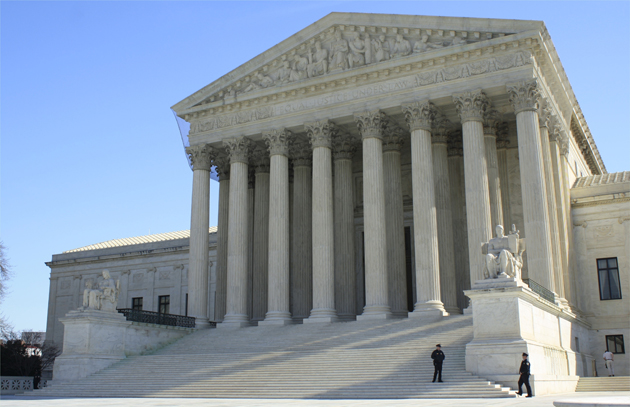Today, Monday June 25, the Supreme Court handed down its ruling on the constitutionality of Arizona's controversial immigration law, S.B. 1070. It was a split decision, with groups on both sides of the issue claiming a victory. Specifically at issue were 4 controversial provisions of the bill, all of which the government alleged were pre-empted by federal immigration law and thus violative of the Supremacy clause. The majority of the Court agreed and 3 provisions were struck down:
• Section 3. This provision makes it a crime not to register with the federal government and not carry a registration card.
• Section 5(C). This provision makes it a crime to solicit work in the state if not authorized to work in the US
• Section 6. This provision permits State and local police to arrest suspected illegal immigrants without warrant in some cases.
But the heart of the bill, the most popular provision of the bill, Section 2(B), was upheld unanimously by the Court. Section 2(B) gives Arizona officials the authority to determine an individual's immigration status if reasonable suspicion exists that the person is in the country illegally.
Justice Kennedy, usually a supporter of states' rights, wrote the opinion and upheld the federal government's broad federal authority over immigration, stating that only marginal participation on the part of states is permissible. He wrote: "Arizona may have understandable frustrations with the problems caused by illegal immigration while that process continues, but the State may not pursue policies that undermine federal law
Justice Scalia, who concurred in part but dissented in part (because it was his opinion that all of the provisions should have been upheld) said that the case boils down to States' Rights. He wrote: "So the issue is a stark one. Are the sovereign states at the mercy of the federal Executive's refusal to enforce the nation's immigration laws?" While the President's recent executive order to stop deportations of young adults who were brought into the country illegally but who are getting an education not an issue before the Court, Justice Scalia took occasion to go after Obama directly on that order. He said that the President's executive order realized Arizona's worse fears - that the federal government, charged with enforcing the nation's immigration laws, would refuse to do so.
 United States Supreme Court in March, 2012: Above. photo by Stan Deatherage
United States Supreme Court in March, 2012: Above. photo by Stan Deatherage
In a scathing dissent, Justice Scalia wrote: "It has come to pass, and is with us today, the specter that Arizona and the States that support it predicted: A Federal Government that does not want to enforce the immigration laws as written, and leaves the States' borders unprotected against immigrants whom those laws would exclude. So the issue is a stark one. Are the sovereign States at the mercy of the Federal Executive's refusal to enforce the Nation's immigration laws? A good way of answering that question is to ask: Would the States conceivably have entered into the Union if the Constitution itself contained the Court's holding? Today's judgment surely fails that test. At the Constitutional Convention of 1787, the delegates contended with "the jealousy of the states with regard to their sovereignty."
He also wrote: "The laws under challenge here do not extend or revise federal immigration restrictions, but merely enforce those restrictions more effectively. If securing its territory in this fashion is not within the power of Arizona, we should cease referring to it as a sovereign State. I dissent."
What is the practical result of this decision? While the key provision - the most popular provision - of Arizona's law was upheld, that holding for all intents and purposes might be meaningless under the Obama administration's enforcement scheme. Unfortunately, Section 2(B) lacks teeth. It may require state law enforcement to make immigration status determinations, but there isn't much that the state can do once those determinations are made. The state can pass the information along to federal immigration authorities (ICE), who are then free to do nothing. If the federal government intends to do nothing with the information, nothing will be done. In other words, Section 2(B) won't result in anybody being deported. Was this just an exercise in futility on the part of Arizona?
55% of Americans were hoping the Arizona law would have been upheld in its entirety. 55% of Americans said they would like to see such a strict immigration law passed in their own states.
Do we have a constitutional republic? Or do we have a government run by a tyrant, a man of questionable background and dubious intentions who defines the Constitution as he sees fit and enforces only those laws he wants to?
References:
Arizona v. United States (2012), decision: http://www.supremecourt.gov/opinions/11pdf/11-182b5e1.pdf
http://www.scotusblog.com/2012/06/courts-strikes-down-much-of-arizona-immigration-law/
http://www.scotusblog.com/2012/06/supreme-court-mostly-guts-s-b-1070/
Diane Rufino has her own blog For Love of God and Country. Come and visit her. She'd love your company.

























That means your grandparents were seeking to escape the fascist Benito Mussolini.
Does that make you a second generation American, or is the vernacular Italian/American? I do not mean to offend.